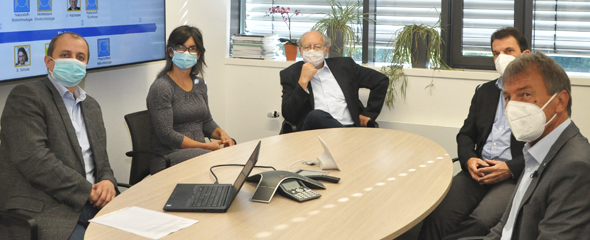The starting point for the further development of the Helmholtz Institute for Pharmaceutical Research Saarland, a site of the Helmholtz Centre for Infection Research (HZI), is the 70 million euro funding that the federal and state governments pledged last year for thematic and spatial expansion. In addition, all partners will use personnel resources and sophisticated laboratory technology for close collaboration. Tobias Hans, Minister President of the Saarland, emphasises: "With the expansion of research capacities in the Saarland, we are specifically strengthening key areas of our innovation strategy. The main pillar of the research focus "NanoBioMed" is - together with the university - the HIPS. The expansion of HIPS and the close collaboration with the university set the course for top-level drug research in Saarland. In addition to excellent research, I also see great development potential for the local economy, especially through application-oriented translational drug research."
The overarching goal is to bring findings from basic research, in the form of active compounds, into clinical application - a process known in pharmaceutical research as translation. In order to accelerate this development process, it is important to closely link application-oriented research in various areas of the life sciences with clinical research and the pharmaceutical industry. One task will therefore also be to involve new partners from science and industry in joint projects. "The additional funding from the federal and state government will enable us to significantly expand our expertise as well as the required expansion of HIPS' resources. We are delighted about this opportunity. Through a targeted collaborative work programme with our partners at Saarland University, we can bring the different disciplines closer together. This will bring us a big step closer to targeted drug discovery," says HIPS Managing Director Rolf Müller.
HIPS is an excellent example of successful collaboration between a non-university research institution like HZI and a university, where both partners combine and strengthen their expertise in pharmaceutical research
At the beginning, the centre will primarily operate as a virtual network, but in the future, the researchers will work together in direct exchange at HIPS. On the part of Saarland University, these scientists primarily originate from medicine, computer science, bioinformatics and chemistry. Together with HIPS, they will focus on the various sub-areas of drug development. The aim is to identify new active compounds, to analyse them systematically and to improve the active substances using chemical and biotechnological approaches. In addition, the question to be addressed is how active compounds can be transported to their site of action in the body. Another focus will be bioinformatics methods, which can be applied to enormously accelerate the development of active compounds. This involves analysing large amounts of data, such as those generated by the genome sequencing of microbial drug producers. University President Manfred Schmitt sees the new centre as a great opportunity: "It now offers us the opportunity to grow even closer together in the field of drug research and to make maximum use of the existing synergies. In the Saarland, we have top-class research teams at HIPS and at both university locations who are investigating novel active compounds at the highest scientific level in basic biomedical research, in preclinical studies and in clinical application."
Microbiome research will also be at the heart of the new centre. This area deals with how the body's own bacteria can be exploited for the development of active compounds. It requires close collaboration between the natural sciences and medicine. To enable the transition of findings from basic research into new active compounds, experienced scientists and pharmacists from industry have already been recruited for the new centre. They are to accompany the translation processes of promising projects in an advisory capacity and thus increase the chances of success for marketing. The spin-off of biotech start-ups is also to be promoted. "HIPS is an excellent example of successful collaboration between a non-university research institution like HZI and a university, where both partners combine and strengthen their expertise in pharmaceutical research," says Dirk Heinz, Scientific Director of HZI. "The thematic expansion now offers additional points of contact to further intensify the interactions of HZI and its sites with HIPS and Saarland University."
Background: involved scientists
At the start of the new Translational Centre for Bioactive Compounds, six other professors were already involved in addition to the HIPS scientists: Professor Robert Bals (Molecular Therapies for Lung Diseases) and Professor Sigrun Smola (Drug Discovery for Persistent Viral Infections) from Homburg University Hospital, Professors Andreas Keller (Clinical Bioinformatics), Andriy Luzhetskyy (Metabolic Engineering of Actinomycetes) and Uli Kazmaier (Total Synthesis of Natural Products) from Saarland University, and Professor Stephan Sieber from TU Munich (Target Identification of Natural Products). To further strengthen the subject area of bioinformatics as well as microbiome and natural product research at HIPS, appointment procedures for corresponding professorships are currently underway together with Saarland University. In parallel, new professorships are being established at the university in the areas of bioinformatics, natural product synthesis, gastroenterology and structural biology, which shall also be integrated into the virtual centre.
